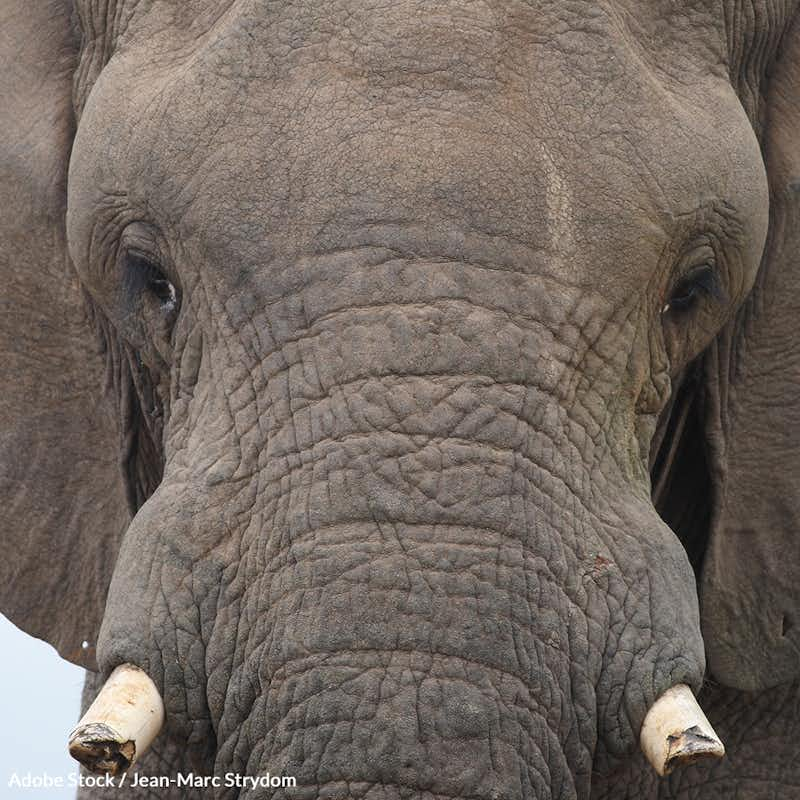Save Elephants and Shut Down China's Ivory Pipeline
123,500 signatures toward our 150,000 Goal
Sponsor: The Rainforest Site
Call on China to stem the surging demand for illegal ivory that is fueling the slaughter of Africa's remaining elephants.

After facing decimation in the 1980s, a global ban on ivory sales has barely saved Africa's elephants from extinction.
When the Convention on International Trade in Endangered Species (CITES) agreed to unleash stockpiles of ivory in a "one-off" sale to China1, the decision kicked off a surge in demand for the coveted "white gold." Rather than reduce the need for black-market ivory and the poaching that supplies it, China's growing middle class wants more.
And they are willing to pay for it.
Soaring prices encourage more poaching and attract the attention of armed rebel groups, corrupt government officials, and international criminal organizations. Five of the world's least stable nations, are home to rampant poaching, with many of the biggest, most horrific elephant killings traced back to Sudan, now home to more foreign-born poacher-terrorists than elephants2.
Park rangers are often the only forces going up against the killers. Outnumbered and ill equipped, they're manning the front line in a violent battle. Meanwhile, profits from these violent conflicts fund other illegal activities elsewhere in the world3.
Park rangers are often the only forces going up against the killers. Outnumbered and ill equipped, they're manning the front line in a violent battle. Meanwhile, profits from these violent conflicts fund other illegal activities elsewhere in the world3.
In Mozambique, years of poaching and war have accelerated evolution, leading to more than half of the female elephant population unable to grow tusks4.
In 2013, about 400 tons of ivory was trafficked out of Africa, the tusks of 50,000 elephants. The price of ivory in China has since sky-rocketed from $6 a kilo in 1976 to $3000 today, much more than most Africans earn in a year4.
Help us reverse this bloody path towards extinction. Sign the petition below and fight poaching by calling on the Chinese Ambassador to the United States to cooperate with international authorities in targeting illegal elephant poaching and smuggling.
- Convention on International Trade in Endangered Species of Wild Fauna and Flora, (7 November 2008), "Ivory auctions raise 15 million USD for elephant conservation."
- Bryan Christy, National Geographic (12 August 2015), "How Killing Elephants Finances Terror in Africa."
- Richard Schiffman, New Scientist (14 May 2014), "Ivory poaching funds most war and terrorism in Africa."
- Christina Larson, Associated Press (21 October 2021), "Why no tusks? Poaching tips scales of elephant evolution."
The Petition:
Dear Chinese Ambassador to the United States:
As long as there is a market for ivory, there will continue to be a demand. Far from reducing demand, the 2008 sale of stockpiles in China has only whetted the world's appetite for additional ivory, driving up prices for this coveted "white gold". Rising prices, in turn, have corrupted government officials and attracted organized crime. And as the New York Times observed, the availability of legally sanctioned ivory has provided the "ideal legal camouflage" for smugglers to launder their illicit goods. And African elephants pay the ultimate price.
In just one example, a recent study published in the scientific journal PLoS One illustrates the consequences for Africa's elephants. According to the research, populations of forest elephants in Central Africa, highly valued for their hard ivory, declined an astonishing 62% over the past ten years, a pace that spells extinction within the next decade.
But the illegal ivory trade is not just a threat to elephants. The increasing scale and sophistication of the poachers and smugglers suggests the involvement of organized crime and militarized rebel organizations with networks spanning national boundaries. These groups threaten stability and peace well beyond the forests and savannas the elephants roam. The tremendous profit made from a shipment of illegal ivory then finances violence elsewhere, much in the same way blood diamonds funded human conflict in past decades.
It remains in China's best interest to see an end to this bloody trade. The 2011 ban on ivory in auction houses and the 2012 ban on online sales both represent positive steps towards this end. Continued seizures, arrests, and prosecutions demonstrate a dedication to cracking down on the illegal trade. Unfortunately, the legal trade is also part of the problem, deceiving consumers into believing their purchases are sanctioned by the state. And a growing middle class further burdens already taxed elephant populations.
As the mounting death toll illustrates, it is not enough to target smugglers and range states alone — destination markets must enforce stricter measures as well. Evidence suggests as much as 50% of the world's ivory is destined for Chinese markets, requiring about 220 tons of raw ivory, or roughly 20,000 elephants, each year.
The current state of affairs suggests three areas for improvement:
- Better education for consumers who don't fully comprehend the impact of their purchase. One survey suggests that seven out of ten Chinese consumers believe the ivory is harvested in a sustainable way. If they better understood the consequences for elephants — an early and brutal death — then they could make better purchasing decisions.
- Better coordination with range states, sharing law enforcement resources and intelligence to crack down on the criminal networks responsible.
- Better regulation culminating in a renewed ban on the sale of ivory in China.
The crisis facing Africa's elephants offers China an opportunity to lead the way, leveraging your growing influence in the world and establishing a model of international cooperation. Without Chinese cooperation and leadership on this matter, African elephants face a dire future, or worse, no future at all.